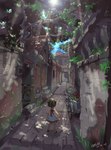Help: DText
← E621 Wiki – DText
Contents: Basics: Colors | Links | Post Thumbnails
Blocks: Quote | Code | Header | List | Section | Table
Other: Escaping DText | Anchors
DText
DText is the name for e621's custom text formatting language. It's a mishmash of several markdown languages including Textile, MediaWiki, BBCode, and Snudown.
↑ Basic Formatting
| Syntax | Result |
|---|---|
| [b]Bold[/b] | Bold |
| [i]Italics[/i] | Italics |
| [s]Strikeout[/s] | |
| [u]Underline[/u] | Underline |
| [sup]Superscript[/sup] | Superscript |
| [sub]Subscript[/sub] | Subscript |
| [spoiler]I'm a spoiler![/spoiler] | I'm a spoiler! |
| `inline code` | inline code |
| [color=red]I'm red![/color] | I'm red! |
↑ Colors
| Syntax | Result | Info |
|---|---|---|
| [color=pink]I'm pink![/color] | I'm pink! | See also HTML color names on Wikipedia |
| [color=artist]I'm an artist![/color] | I'm an artist! | Tag category names also work |
| [color=#ff0000]I'm red![/color] | I'm red! | 3-digit Hex codes work too |
↑ Links
| Syntax | Result | Info |
|---|---|---|
| https://example.com | https://example.com | Standard links will automatically parse. |
| <https://example.com/link_(test)> | https://example.com/link_(test) | Include characters like ) at the end of the link. |
| "A link":https://example.com/ | A link | Link with a custom title. |
| "A link":[https://example.com/link_(test)] | A link | Link with enclosing brackets, ensuring all characters are included in the link. |
| "A link":/users | A link | Relative link (within site). |
| [[simple background]] | simple background | Link to wiki page. * |
| [[#quote]] | #quote | Link to anchor on current page (wiki or otherwise). * |
| {{mammal -cat}} | mammal -cat | Link to tag search. |
| post #1234 | post #1234 | Links to a post. |
| post changes #1234 | post changes #1234 | Links to a posts tag history. |
| topic #1234 | topic #1234 | Links to a forum topic. |
| comment #1234 | comment #1234 | Links to a comment on a post. |
| blip #1234 | blip #1234 | Links to a blip. |
| pool #1234 | pool #1234 | Links to a pool. |
| set #1234 | set #1234 | Links to a set. |
| takedown #1234 | takedown #1234 | Links to a filed takedown request. |
| record #4321 | record #4321 | Links to a feedback record for a user. |
| ticket #1234 | ticket #1234 | Links to a complaint or username change ticket. |
Some link formats can have custom titles appended to them.
[[wiki page|Some Text]] – Some Text
[[#anchors|Anchors work too!]] – Anchors work too!
↑ Post Thumbnails
thumb #12345
↑ Block Formatting
These tags create block-level content. That is, they are not inline like the ones under Basic formatting.
↑ Quote
[quote]Please quote me![/quote] I'm quoting you!
Please quote me!
I'm quoting you!
↑ Code
Code blocks render characters within blocks of monospaced text that are placed between [code] and [/code]. Thus, [code]std::cout << "Hello, world!\n";[/code] results in:
std::cout << "Hello, World!";
Note: Because of how block-level tags are parsed, newlines may not show up correctly if there is DText inside them. For ways to get around this, see Escaping DText.
↑ Header
h1. Header 1 h2. Header 2 h3. Header 3 h4. Header 4 h5. Header 5 h6. Header 6
Header 1
Header 2
Header 3
Header 4
Header 5
Header 6
↑ List
Create lists by prepending each item with a *. Use multiple *s for nested lists
* Item 1 * Item 2 ** Item 2A ** Item 2B * Item 3
- Item 1
- Item 2
- Item 2A
- Item 2B
- Item 3
↑ Section
Sections are collapsible boxes used for condensing large amounts of text. Like quote tags they can accept any DText (except headers).
Note that page anchors won't work inside collapsed sections.
[section]Pretend this is a really large block of text.[/section] [section=Some Title]This one has a title.[/section] [section,expanded=Title]This is expanded by default.[/section]
Pretend this is a really large block of text.
Some Title
This one has a title.
Title
This is expanded by default.
↑ Table
Tables use a format that resembles HTML or the BBCode format.
[table]
[thead]
[tr]
[th] header [/th]
[th] header [/th]
[th] header [/th]
[/tr]
[/thead]
[tbody]
[tr]
[td] column [/td]
[td] column [/td]
[td] column [/td]
[/tr]
[tr]
[td] column [/td]
[td] column [/td]
[td] column [/td]
[/tr]
[/tbody]
[/table]
Result
| header | header | header |
|---|---|---|
| column | column | column |
| column | column | column |
↑ Other
↑ Escaping DText
Use backticks or #Code tags to escape DText.
↑ Page Anchors
Anchors are markers that tell your browser to jump to a specific place on the page.
Anchor names must be spelled using only letters, numbers, and underscores.
| Syntax | Result | Usage |
|---|---|---|
| My anchor: [#some_anchor] | My anchor: | This is the target. It will be hidden on the page wherever you put it. |
| [[#anchors]] | #anchors | Link to anchor on current page. * |
| [[mammal#equine]] | mammal#equine | Link to anchor on different wiki page. * |
